Still, views of China – and its soft power – are more positive in middle-income countries
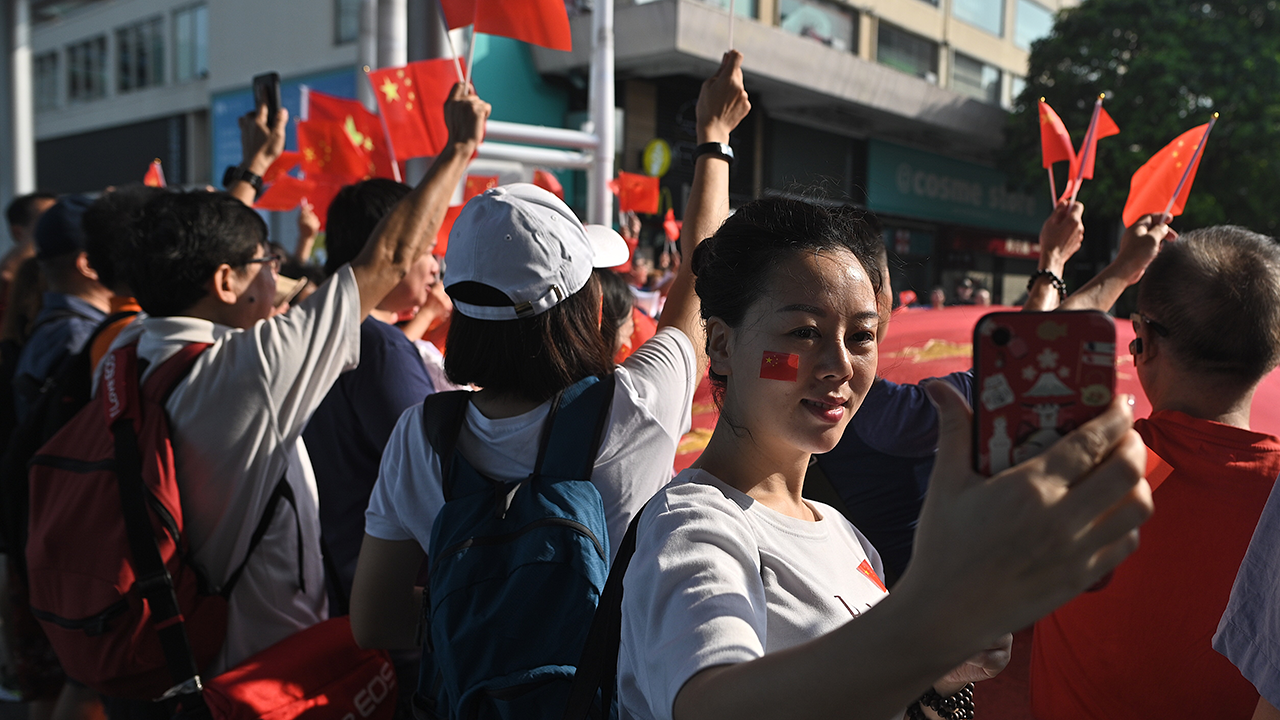
This Pew Research Center analysis focuses on public opinion of China and President Xi Jinping in 24 countries in North America, Europe, the Middle East, the Asia-Pacific region, sub-Saharan Africa and Latin America. The report explores views of China’s role in the world, including as an economic power, and perceptions of Chinese soft power. This is the first year since 2019 that the Global Attitudes Survey has included countries from Africa and Latin America, which were not included more recently due to the coronavirus outbreak.
For non-U.S. data, this report draws on nationally representative surveys of 27,285 adults conducted from Feb. 20 to May 22, 2023. All surveys were conducted over the phone with adults in Canada, France, Germany, Greece, Italy, Japan, Netherlands, South Korea, Spain, Sweden and the United Kingdom. Surveys were conducted face to face in Argentina, Brazil, Hungary, India, Indonesia, Israel, Kenya, Mexico, Nigeria, Poland and South Africa. In Australia, we used a mixed-mode probability-based online panel.
In the United States, we surveyed 3,576 U.S. adults from March 20 to 26, 2023. Everyone who took part in this survey is a member of the Center’s American Trends Panel (ATP), an online survey panel that is recruited through national, random sampling of residential addresses. This way nearly all U.S. adults have a chance of selection. The survey is weighted to be representative of the U.S. adult population by gender, race, ethnicity, partisan affiliation, education and other categories. Read more about the ATP’s methodology.
Here are the questions used for the report, along with responses, and the survey methodology.
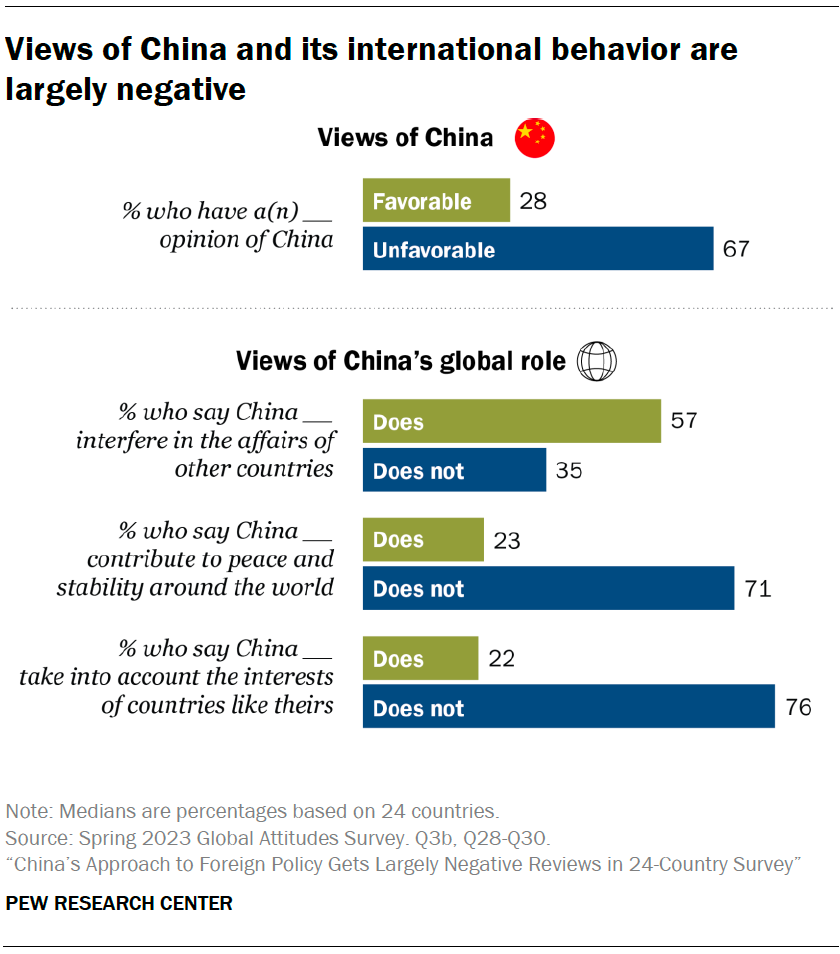
Views of China are broadly negative across 24 countries in a new Pew Research Center survey: A median of 67% of adults express unfavorable views of the country, while 28% have a favorable opinion.
Negative views extend to evaluations of China’s international actions. Despite several high-profile diplomatic initiatives by Beijing over the past year – such as brokering a peace deal between Saudi Arabia and Iran and issuing a 12-point proposal for the end of violence in Ukraine – a median of 71% think China does not contribute to global peace and stability.
Most people also think China does not take into account the interests of other countries in its foreign policy (76%) and a median of 57% say China interferes in the affairs of other nations a great deal or fair amount.
Still, attitudes toward China are somewhat rosier in middle-income than high-income countries. Across eight middle-income countries – places Pew Research Center has not surveyed since 2019 due to the challenges of conducting face-to-face interviews during the pandemic – India stands out as the only middle-income country in which a majority has unfavorable views of China. And in three middle-income countries – Kenya, Mexico and Nigeria – a majority even gives China a positive rating.
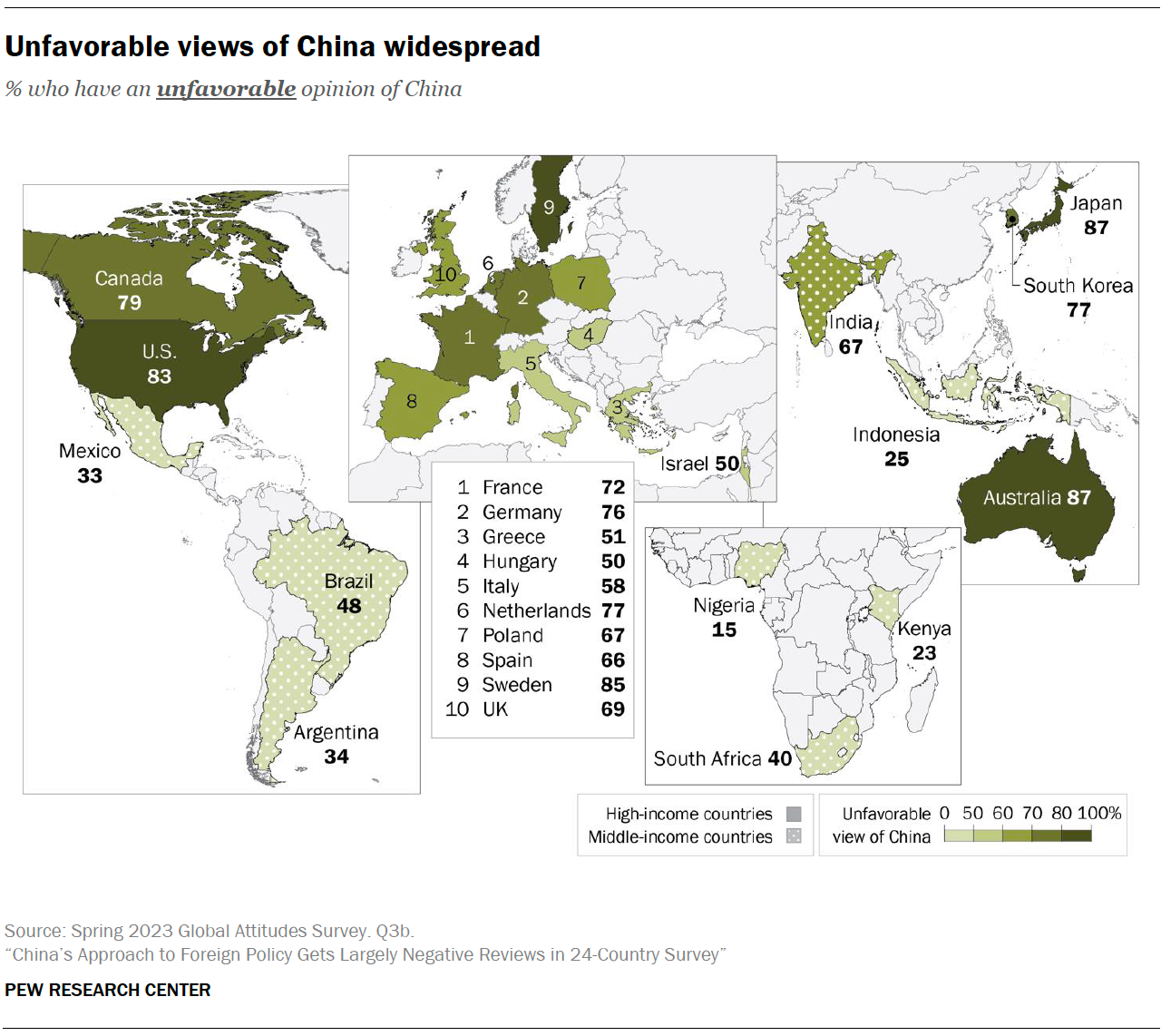
Fewer in these middle-income countries also criticize China’s global behavior, and many more see China’s “soft power” appeal. Indeed, publics in these middle-income countries offer relatively favorable ratings for China’s entertainment products, its universities and its standard of living – while few in most high-income countries agree.
Across all 24 countries surveyed, however, there is more agreement about China’s technology. A median of 69% describe China’s technological achievements as the best or above average relative to other wealthy nations, with similar shares in high- and middle-income countries. A median of 54% also see China’s military as among the best in the world.
But views of the country as the world’s foremost economic power have faltered somewhat in recent years. More people now name the United States as the top economic power than China (a median of 42% vs. 33%, respectively). Much of this shift has come in high-income countries, where the share naming China has fallen in nearly every surveyed country – including by double digits in Germany, the Netherlands, Poland and Sweden.
In the U.S., where equal shares (43%) called China and the U.S. the world’s leading economic power in 2022, views have shifted significantly over the past year; now, Americans are 10 percentage points more likely to name the U.S. than China (48% vs. 38%). (For more on American views of China, read “Americans are Critical of China’s Global Role – as Well as Its Relationship With Russia”.)
These findings come from a new Pew Research Center survey conducted from Feb. 20 to May 22, 2023, among more than 30,000 people in 24 countries. Below are some of the other findings regarding China’s overall image, views of Chinese foreign policy, ratings of President Xi Jinping, opinions about Chinese soft power and its economic power.
Overall ratings for China
Across many high-income countries surveyed, which are in North America, Western Europe and parts of the Asia-Pacific region, a large majority has unfavorable views of China, as has been the case for multiple years. Indeed, in almost every high-income country surveyed, negative views currently stand at or near historic highs. In most countries, this does not reflect a significant increase over last year; rather, negative views have simply remained high in recent years. One notable exception is Poland, where negative views have increased 12 points during a period of strained bilateral relations, perhaps related to China’s handling of the war in Ukraine.
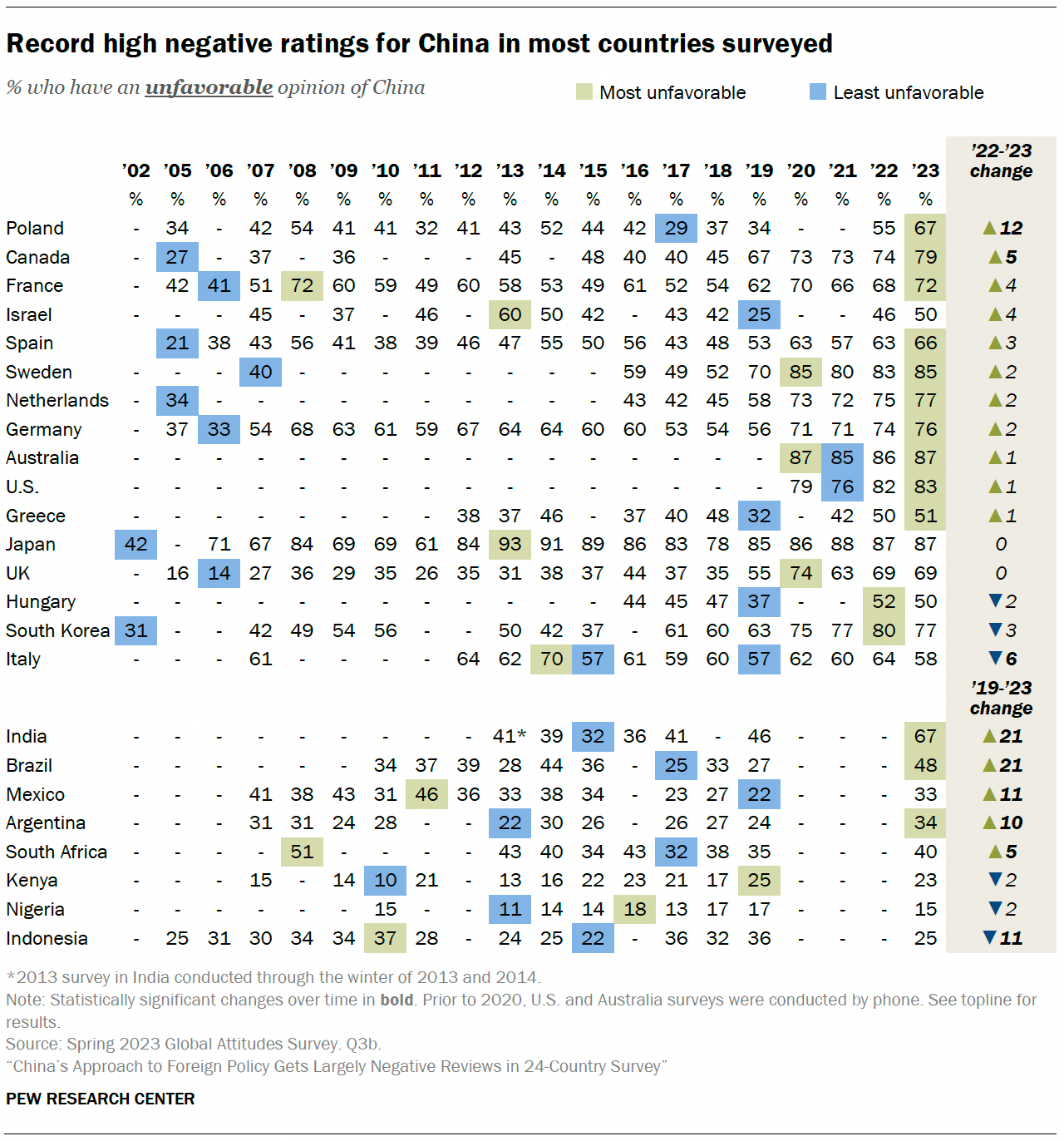
Views of China in middle-income countries are relatively more positive. Still, negative ratings in most of these countries have also grown since the countries were last surveyed, pre-pandemic. In South Africa and Mexico, for example, opinions have turned somewhat more negative since 2019, and in Argentina, Brazil and India, negative views have even reached historic highs. In India, military conflicts along a contested border may have contributed to the 21 percentage point increase in unfavorable opinion.
China’s role on the world stage
Majorities in most countries do not think China takes into account the interests of countries like theirs. In Canada, France, Israel, Spain and Sweden, around half or more say China doesn’t consider them at all. Only in the three sub-Saharan African countries surveyed, as well as in Indonesia, does around half or more of the public feel like China listens to their country.
A median of 71% also think China does little or nothing at all to contribute to global peace and stability, compared with a median of 23% who say it is doing a great deal or a fair amount. Australians, Canadians, Indians, Israelis and South Koreans are particularly likely to say China is doing nothing at all to help with global peace and stability.
Most also see China as an interventionist power. A median of 57% say China does interfere a great deal or a fair amount in the affairs of other countries, while a median of 35% say it does not do so much or at all. Around seven-in-ten or more in Australia, Canada, Japan, South Korea, Spain and the U.S. see China getting involved in the affairs of other countries – and many of these places also stood out for the high share who said China’s involvement in domestic politics in their own country was a very serious problem in a 2022 Pew Research Center survey.
But the country which is most likely to see China interfering in the affairs of other countries in this year’s survey is Italy (82%). Italy, which was the only G7 country to join China’s Belt and Road Initiative (BRI), was debating leaving the initiative at the time that the survey was conducted, but treading delicately for fear of stoking possible Chinese retribution against Italian businesses.
Attitudes toward Xi
Few in the 24 countries surveyed have confidence in Chinese President Xi Jinping to do the right thing regarding world affairs. Across most of Western Europe, the U.S., Canada and much of the Asia-Pacific region, around half in each country say they have no confidence in him at all. Indonesia, Kenya, Nigeria and South Africa stand out as the only countries where a majority or plurality have confidence in his leadership.
Confidence in Xi is closely related to views of China more broadly. In each country surveyed people with unfavorable views of China are more likely to have little confidence in the Chinese president, and vice versa.
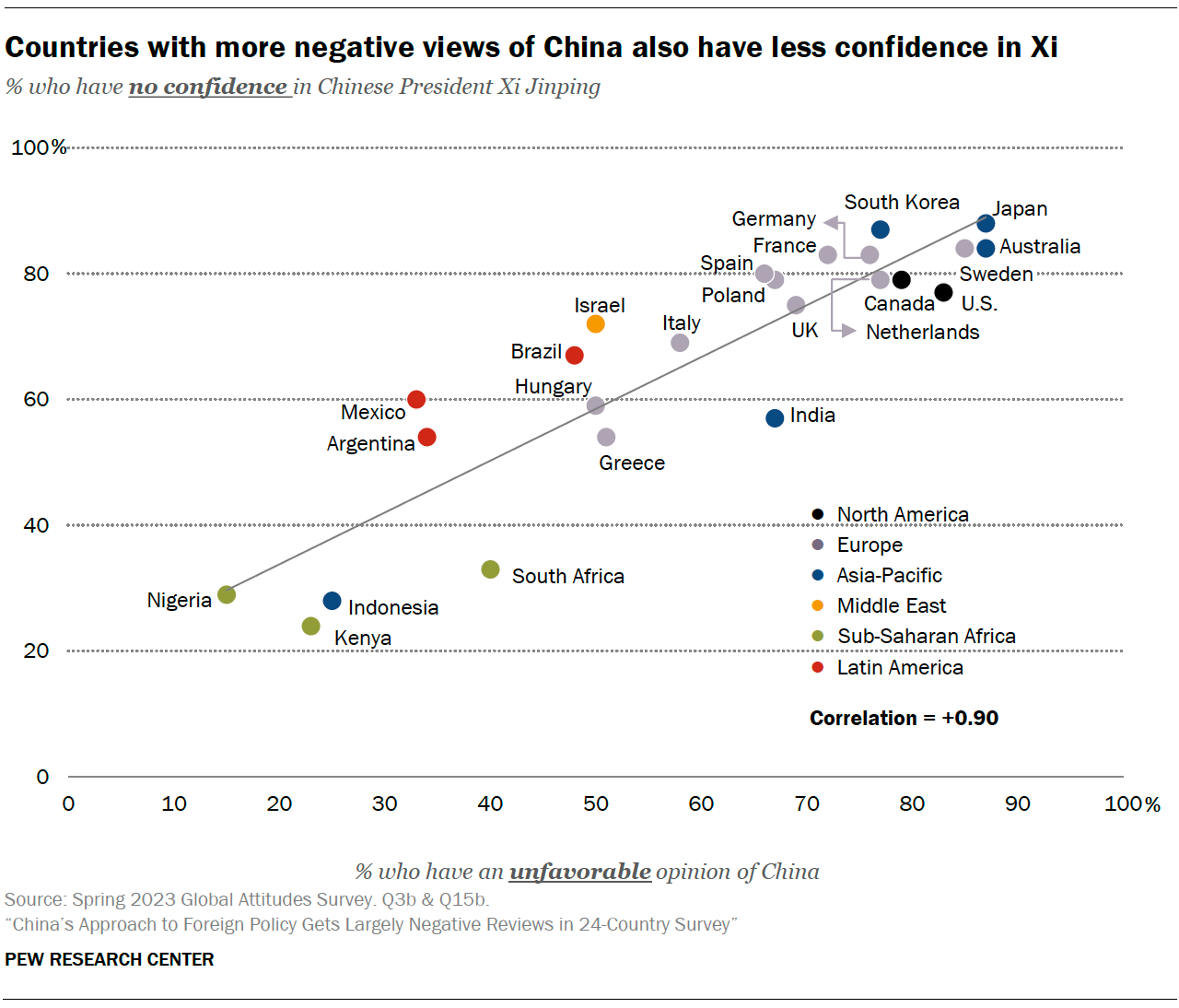
Chinese soft power
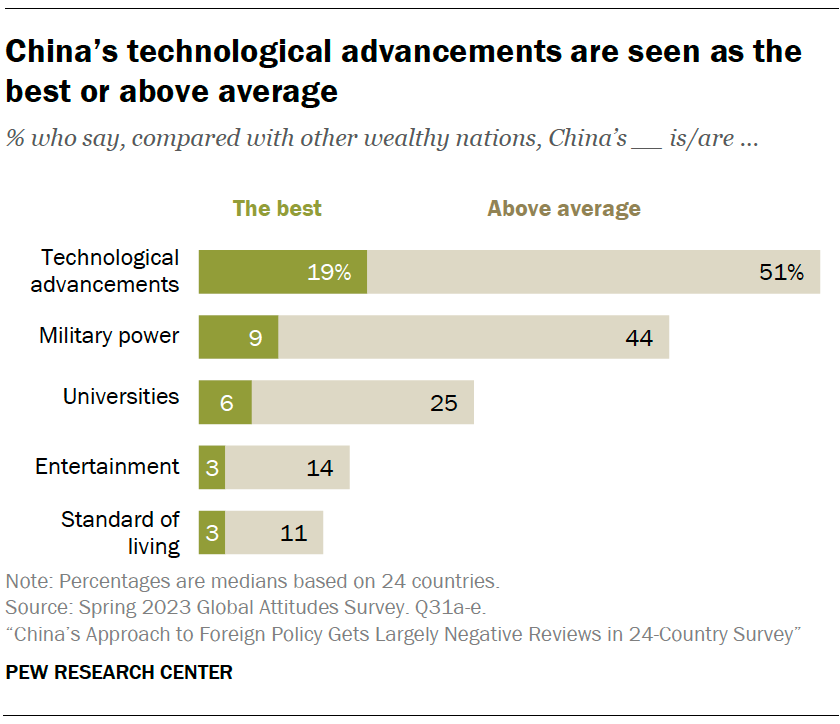
When it comes to elements often considered part of a country’s “soft power,” China’s technological achievements receive high marks, though fewer say the same about its universities, entertainment products or standard of living.
In fact, outside of South Korea, nearly half or more in every country say Chinese technological advancements are the best in the world or above average relative to other wealthy nations. And in many of the middle-income countries, around four-in-ten call Chinese technology the best in the world.
Middle-income countries – many of which are increasingly reliant on Chinese companies like Huawei for components of their 4G and 5G systems – were also asked specifically about technology such as phones, tablets or computers made by Chinese companies. Across these eight countries, there is a relatively widespread sense that these products are well-made. Middle-income publics are more divided when it comes to their cost: A median of 50% describe them as inexpensive, while 44% call them costly.
They are also somewhat divided when it comes to whether technological products made by Chinese companies protect people’s personal data (a median of 45%) or make their data unsafe (40%). (Americans were asked a different but related question about Chinese social media companies; large majorities have little confidence that they will use personal information responsibly or follow privacy policies.)
In every country, at least a plurality – and often a majority – also see China’s “hard power,” its military, as one of the best in the world or above average.
Chinese economic power
Fewer name China as the world’s leading economic power than the U.S. (a median of 33% vs. 42%). And, in many countries, the share naming China as the world’s leading economy has gone down in recent years.
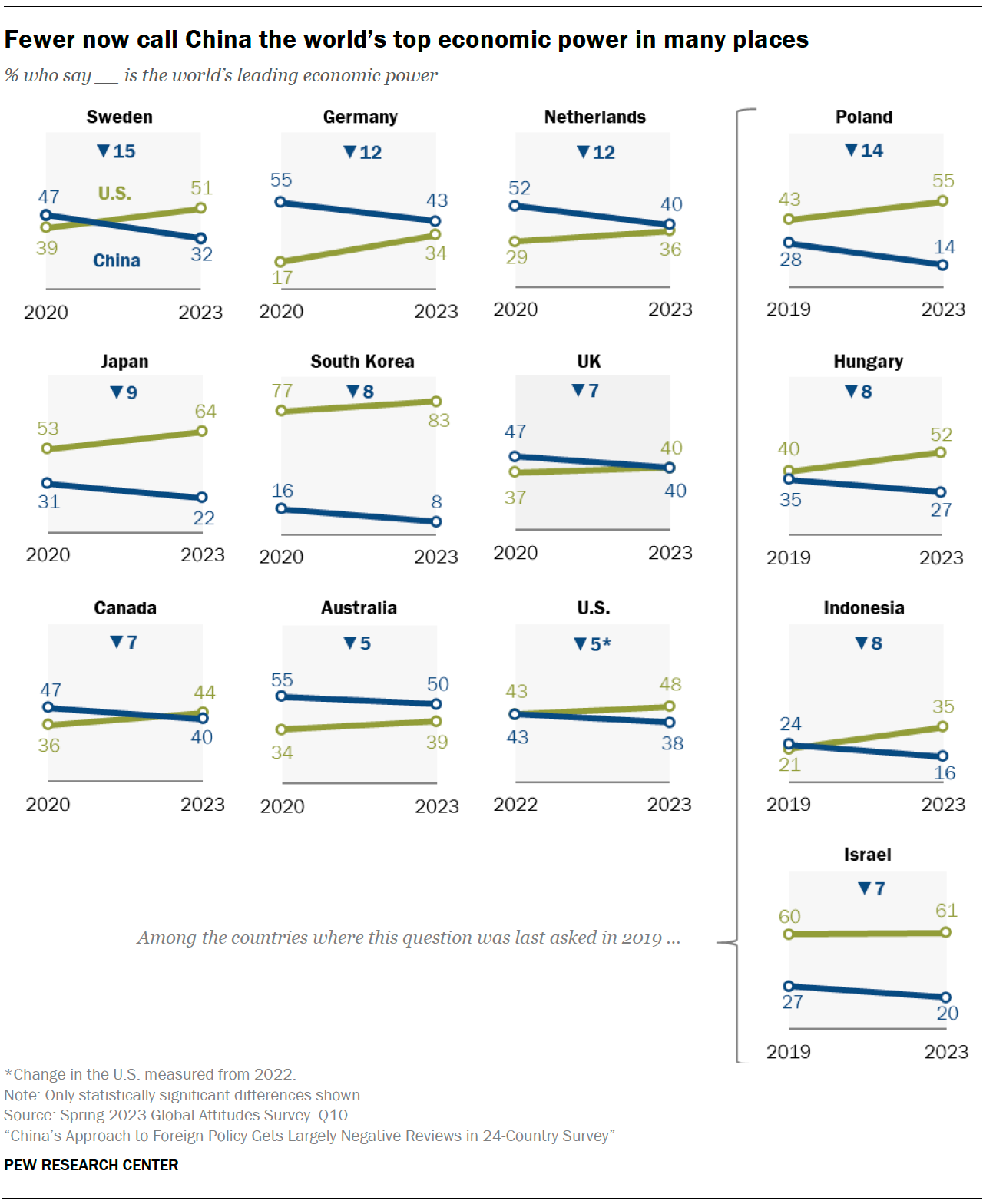
Interestingly, China’s image as an economic superpower is stronger in high-income countries than middle-income ones. Italy, for example, is the only country where a majority (55%) calls China the leading economic power.
Still, people in middle-income countries do recognize economic benefits from their relations with China. A different survey question, asked only in these countries, finds that around half or more in six middle-income countries say their nation’s economy has benefited a great deal or a fair amount from Chinese investment. In Nigeria, Kenya and South Africa, around seven-in-ten or more say this.
In the U.S., Americans were also asked to name the country which poses the top threat to the U.S. Not only was China the top answer, by far, but Americans see it as both an economic and a national security threat – in sharp contrast to Russia, which is primarily seen as a security threat. To read more about this related analysis, see “Americans name China as the top threat facing the U.S.”
Road map to the report
The chapters that follow discuss these findings and others in more detail:
- Chapter 1 looks at overall opinion of China across the countries surveyed, including how perceptions have shifted over the years
- Chapter 2 considers the negative and positive roles China plays in international affairs
- Chapter 3 reviews global public opinion about which country is the world’s leading economic power
- Chapter 4 explores perceptions of Chinese soft power, summarizing how people across 24 countries rate China compared with other wealthy nations
- Chapter 5 examines confidence in Chinese President Xi Jinping to do the right thing in world affairs


